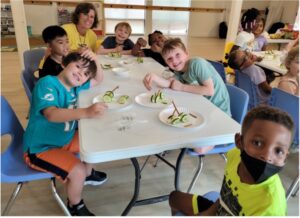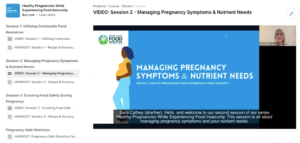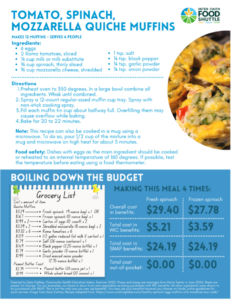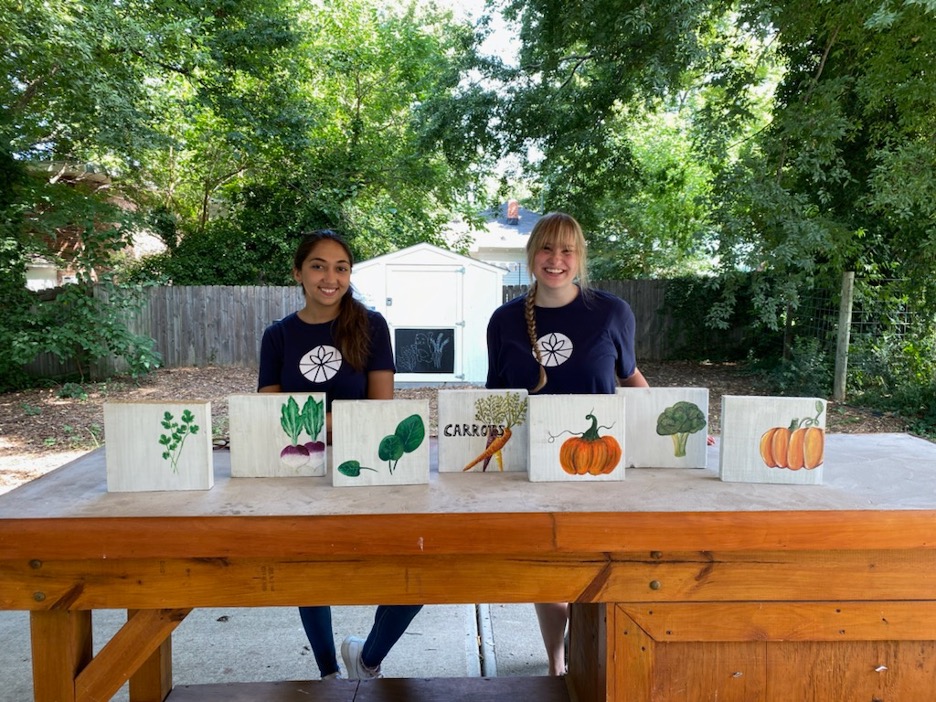It is hard to believe my summer with the Inter-Faith Food Shuttle in Raleigh, NC has wrapped up! I partook in a wealth of experiences during my practicum as I worked within the Food Shuttle’s fast-paced environment, which feeds, teaches, and grows our local communities.

As someone not originally from North Carolina, my time with the Food Shuttle was so valuable in becoming part of my community here. Throughout the summer, I traveled around our 7 service counties, doing everything from meeting and speaking with neighbors at food distributions, teaching nutrition classes, building curricula, and recovering and redistributing food to local partners. Whether I was climbing and crawling (with impeccable grace, might I add) over boxes in a semitruck trailer to make sure recovered spinach in the back got delivered to Raleigh’s Salvation Army, or racing around cucumber scooters on table tops with kiddos from Advantageous in Chapel Hill at my Cooking Matters class, each engagement helped me gain a deeper understanding of our local food system, the many people and local partners who keep it running, and the people who are served by it.
Each month during my internship, we had intern meetings where we discussed various topics related to food security. During our last intern meeting of the summer, we opened it up with the question, “What is one thing that surprised you most about your experience with the Food Shuttle?” Mine was a relatively simple response, but it is something I can’t stop thinking about. During my 3 months with the Food Shuttle, I was constantly shocked by how wide the network of people is that keeps our communities fed. Even when only looking at the Food Shuttle, I was in awe of the constant movement among my colleagues, our volunteers, and our local partners, and how that translated into food getting to neighbors. This then made me think what our food system could look like if more entities within it chose to function or were able to function with the same vigor and with food justice as a driving principle. Perhaps, we could build a food system that not only ensures people are fed without undue hardship, but one that also protects people from environmental harms, one that invests in communities rather than gentrifies them, and one that uses community knowledge and experiences to set their agenda rather than agendas set by outside forces.

With this in mind, through various learning opportunities, I learned more about food apartheid, and how white supremacy culture in nutrition continues to yield oppression and erasure in our local food system. Too, it was eye-opening to dive into how the history of colonialism plays into how I conceptualize nutrition, as well as how it molds our local foodways. This was extremely impactful in the way I approached developing my curriculum for my 3-part webinar series, Healthy Pregnancies While Experiencing Food Insecurity. To that point, I also learned more about trauma-informed nutrition education, and attempted to integrate concepts from it into the my curriculum. Specifically, I focused on integrating concepts like power, choice and strengths individuals have when interacting with food; overall wellness as opposed to strict, numbers-based nutrition suggestions; opportunities for skills-building related to food and adaptations of these based on various needs; and providing information in a non-judgmental manner to reduce stress or anxiety surrounding food.

Practically, this looked like designing my lessons with a similar pattern. Each session started with one or two pregnancy-safe stretches to promote mental and physical wellness. We then transitioned into lesson content, with Session 1 being about using community food resources like WIC and SNAP, Session 2 being about managing pregnancy symptoms and nutrient needs, and Session 3 being about food safety during pregnancy. After that general information was presented, we then applied that knowledge to a recipe activity where we looked at how we could design our meals to maximize monthly WIC and SNAP benefits and the nutrients on our plate. With that, I displayed a recipe and any adaptations that could be made to it and then broke down a budget looking at the overall cost, cost in WIC benefits, and cost in SNAP benefits if a person made that particular meal once a week for four weeks. With these lessons, it is my hope that pregnant neighbors experiencing food insecurity feel equipped, inspired, and in charge of their food, their bodies, and their wellbeing.
There are so many other things I could talk about, but if I did, I think my fingers would fall off from typing. So for now, I just want to say that I am so very grateful for my time with the Food Shuttle this summer, and for the opportunity to learn from and work with a group of people who are so keen on feeding our neighbors with justice as a leading principle. I also wanted to say a special thank you to my mentor, Kylee McCombs, for all of her guidance and insight during the development of my practicum products, as well as a big thank you to everyone else at the Food Shuttle! Y’all are absolutely awesome!

Sara C.
